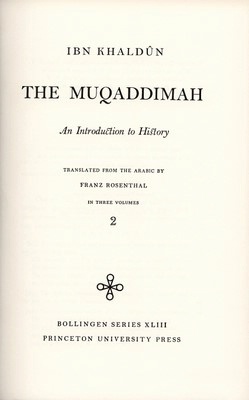Volume Two
Chapter III
[32] The Ranks of Royal and Governmental Authority ...
"It should be known that, by himself, the ruler is weak and he carries a heavy load. He must look for help from his fellow men. He needs their help for the necessities of life and for all his other requirements. How much more, then, does he need it to exercise political leadership over his own species, over the creatures and servants of God whom God entrusted to him as subjects. He must defend and protect the community from its enemies. He must enforce restraining laws among the people, in order to prevent mutual hostitlity and attacks upon property. This includes improving the safety of the roads. He must cause the people to act in their own best interests, and he must supervise such general matters involving their livelihood and mutual dealings as foodstuffs and weights and measures, in order to prevent cheating. He must look after the mint, in order to protect the currency used by the people in their mutual dealings, against fraud. He must exercise political leadership and get people to submit to him to the degree he desires and be satisfied, both with his intentions regarding them and with the fact that he alone has all the glory and they have none. This requires an extraordinary measure of psychology. A noble sage has said: "Moving mountains from their places is easier for me than to influence people psychologically."
It is better that such help be sought from persons close to the ruler through common descent, common upbringing, or old attachment to the dynasty. This makes such persons and the ruler work together in the same spirit. God said: "Give me my brother Aaron as helper (wazir) from my family. Give me strenght through him and let him participate in my business." ...(op. cit., ibid., Vol. II, pp. 3-4)
The Wazirate
(1) (His activities) may concerb ways and means of protecting the community, such as the supervision of soldiers, armaments, war operations, and other matters concerned with military protection and aggression. The person in charge is the wazir, as the term was customarily used in the old dynasties in the East, and as it is still used at this time in the West.
(2) Or, they may concern correspondence with persons far away from the ruler in place or in time, and the execution of orders concerning with whom the ruler has no direct contact. The man in charge is the secretary (kâtib).
(3) Or, they may concern matters of tax collection and expenditures, and the safe handling of these things in all their aspects. The man in charge is the chief of tax and financial matters. In the contemporary East, he is called the wazir.
(4) Or, they may concern ways to keep petitioners away from the ruler, so that they do not crowd upon him and divert him from his affairs. This task reverts to the doorkeeper (hâjib), who guards the door.
The (ruler's) activities do not extend beyond these four fields. Each royal and governmental function belongs to one of them. However the most important field is the one that requires giving general assistance in connection with everything under the ruler's direct control. This means constant contact with the ruler and participation in all his governmental activities. (All the activities) that concern some particular group of people or some particular department are of lower rank. (Among such activities are) the (military) leadership of a border region, the administration of some special tax, or the supervision of some particular matter, such as surveillance (hisbah) of foodstuffs, or supervision of the mint. All these activities are concerned with particular conditions. The persons in charge are, therefore, subordinate to those in general supervision, and the latter outrank them.
It was this way throughout the whole pre-Islamic period. When Islam appeared on the scene and power was vested in the caliph, the forms of royal authority no longer existed, and all its functions disappeared, except for some advisory and consultative ones that were natural and continued to exist because they were unavoidable ..." (op. cit., ibid., Vol. II, pp. 6-7)



